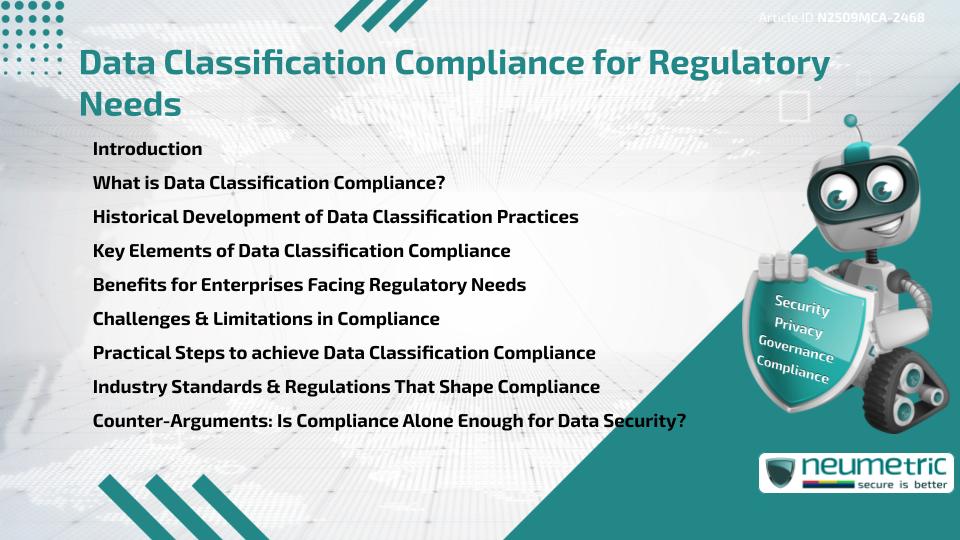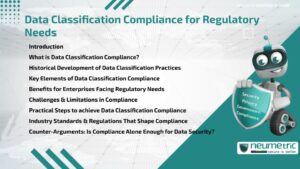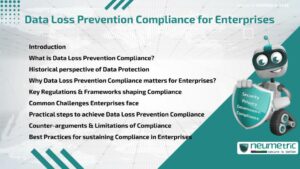Table of Contents
ToggleIntroduction
Data classification Compliance is a critical component of Regulatory adherence in modern enterprises. It involves identifying, labeling & managing data according to its sensitivity & Legal requirements. From Personal Information to Financial Records, proper classification ensures Organisations meet obligations under frameworks such as GDPR, HIPAA & ISO standards. This article explores what Data Classification Compliance is, its historical context, core elements, benefits, limitations & practical steps for enterprises to integrate it into their Governance practices.
What is Data Classification Compliance?
Data classification Compliance refers to the process of categorising data based on Sensitivity & Regulatory obligations, ensuring it is handled, stored & protected appropriately.
For example, personal health records may fall under “Highly Sensitive” data, requiring Encryption & restricted access. In contrast, public marketing materials may be considered “low sensitivity”. Compliance ensures enterprises apply consistent Policies across all categories, avoiding costly mistakes such as exposing confidential information.
Historical Development of Data Classification Practices
The origins of Data Classification can be traced to Government & military institutions, where information was tagged as “Confidential” or “Secret.” With the expansion of digital data in the late twentieth century, industries such as Healthcare & Finance adopted similar practices to protect Sensitive Information.
Legislative milestones such as the Health Insurance Portability & Accountability Act [HIPAA] & the General Data Protection Regulation [GDPR] accelerated the adoption of enterprise-wide Data Classification Compliance. Today, it has become a Standard expectation across industries.
Key Elements of Data Classification Compliance
A strong Compliance program includes:
- Data Identification: Locating structured & unstructured data across systems.
- Classification Categories: Defining levels such as public, internal, confidential & highly sensitive.
- Access Controls: Aligning data handling with User roles & responsibilities.
- Protection Measures: Encryption, Backup & Monitoring tailored to classification levels.
- Policy Enforcement: Regular Audits to ensure Policies are applied consistently.
These elements create a structured approach that reduces the Risk of mismanagement.
Benefits for Enterprises Facing Regulatory Needs
Data classification Compliance offers clear advantages:
- Regulatory Assurance: Helps enterprises demonstrate adherence to GDPR, HIPAA & similar laws.
- Risk Reduction: Minimises exposure of Sensitive Data to unauthorised users.
- Operational Efficiency: Streamlines decision-making about data access & protection.
- Audit Readiness: Provides clear documentation during regulatory inspections.
By categorising data effectively, enterprises can prioritise security resources where they matter most.
Challenges & Limitations in Compliance
Enterprises often face challenges in implementing Compliance programs. Classifying massive volumes of data can be resource-intensive, particularly in large or multi-cloud environments. Human error in categorisation may lead to mislabeling & over-classification can create unnecessary restrictions that hinder productivity.
Practical Steps to achieve Data Classification Compliance
Organisations can take the following steps to establish effective Compliance:
- Conduct enterprise-wide data discovery exercises.
- Define clear classification levels & apply them consistently.
- Implement automated tools for tagging & monitoring.
- Train Employees on classification Policies & responsibilities.
- Regularly review & update classification schemes to reflect evolving regulations.
These actions help ensure that Compliance becomes part of daily Business Operations.
Industry Standards & Regulations That Shape Compliance
Several standards & regulations influence Data Classification practices:
- GDPR for Data Privacy in the European Union.
- HIPAA for Healthcare information protection.
- ISO 27001 for Information Security management.
- NIST Guidelines for mapping information types to security categories.
These references guide enterprises in aligning Data Classification with global expectations.
Counter-Arguments: Is Compliance Alone Enough for Data Security?
Some experts argue that Data Classification Compliance is only the beginning. While Compliance reduces Risks, it does not prevent sophisticated attacks or insider misuse. Enterprises must pair Compliance with broader security strategies, including behavioral Monitoring, Zero Trust models & Incident Response planning. In this sense, Compliance is a foundation, not the finish line.
Conclusion
Data classification Compliance is indispensable for enterprises managing Sensitive Information under strict Regulatory environments. It provides structure, Accountability & Assurance while helping enterprises reduce Risks & demonstrate Responsibility. Though challenges exist, Compliance is a cornerstone of effective Governance.
Takeaways
- Data classification Compliance ensures Sensitive Data is categorised & protected appropriately.
- Regulations such as GDPR & HIPAA drive adoption across industries.
- Benefits include Audit readiness, Risk reduction & Operational efficiency.
- Compliance must be supplemented with proactive Data Security Measures.
FAQ
What is the main goal of Data Classification Compliance?
Its main goal is to ensure data is properly categorised & managed in line with Regulatory & Security requirements.
How does Data Classification support Regulatory Compliance?
It ensures Sensitive Data is protected according to laws such as GDPR & HIPAA, reducing the Risk of violations & penalties.
Can Data Classification Compliance be automated?
Yes, enterprises use automated tools to scan, label & monitor data, though human oversight is still necessary.
What happens if enterprises fail to implement Data Classification Compliance?
They Risk exposing Sensitive Data, incurring Regulatory fines & losing Customer Trust.
Do all industries require Data Classification Compliance?
Yes, though requirements vary, all industries that manage Personal or Sensitive Information benefit from Compliance.
How often should classification Policies be reviewed?
At least annually or whenever regulations or business processes change significantly.
Does Compliance guarantee full Data Security?
No. While Compliance reduces Risks, enterprises must also employ advanced Security Measures to address evolving Threats.
Need help for Security, Privacy, Governance & VAPT?
Neumetric provides organisations the necessary help to achieve their Cybersecurity, Compliance, Governance, Privacy, Certifications & Pentesting needs.
Organisations & Businesses, specifically those which provide SaaS & AI Solutions in the Fintech, BFSI & other regulated sectors, usually need a Cybersecurity Partner for meeting & maintaining the ongoing Security & Privacy needs & requirements of their Enterprise Clients & Privacy conscious Customers.
SOC 2, ISO 27001, ISO 42001, NIST, HIPAA, HECVAT, EU GDPR are some of the Frameworks that are served by Fusion – a SaaS, multimodular, multitenant, centralised, automated, Cybersecurity & Compliance Management system.
Neumetric also provides Expert Services for technical security which covers VAPT for Web Applications, APIs, iOS & Android Mobile Apps, Security Testing for AWS & other Cloud Environments & Cloud Infrastructure & other similar scopes.
Reach out to us by Email or filling out the Contact Form…





